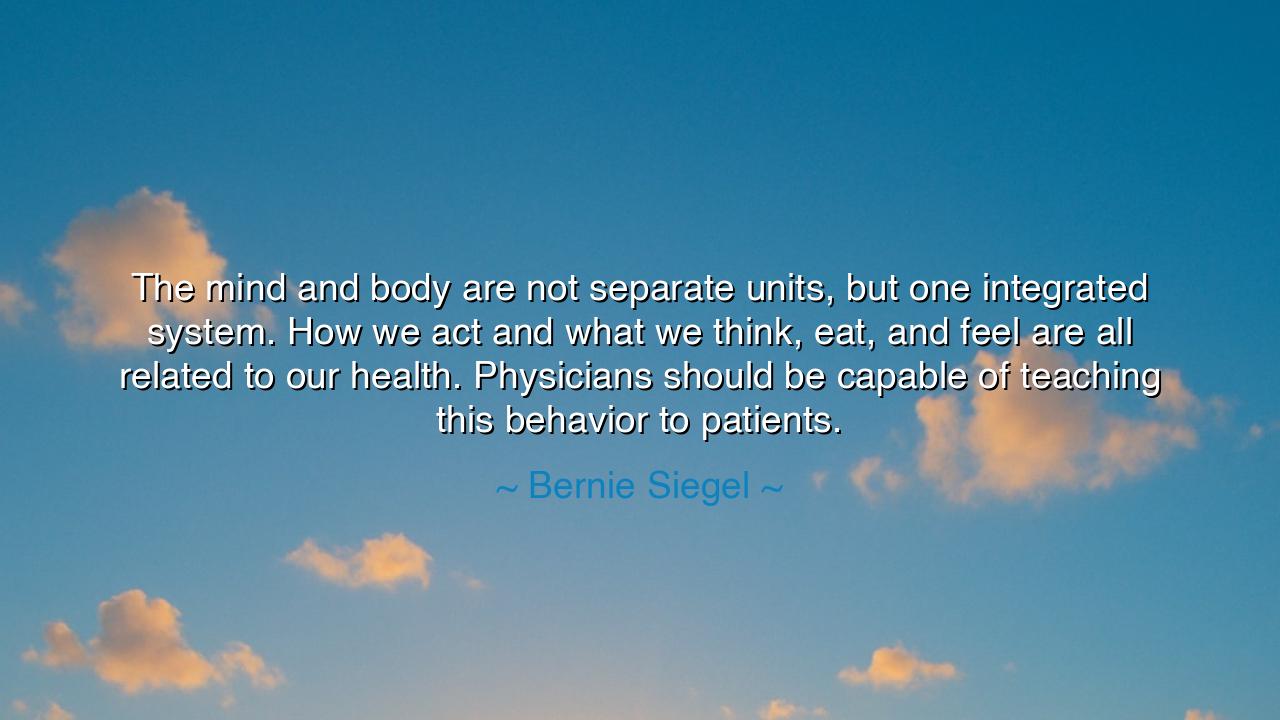
The mind and body are not separate units, but one integrated
The mind and body are not separate units, but one integrated system. How we act and what we think, eat, and feel are all related to our health. Physicians should be capable of teaching this behavior to patients.






In the sacred balance of existence, Bernie Siegel spoke words that reach beyond the realm of medicine into the heart of human truth: “The mind and body are not separate units, but one integrated system. How we act and what we think, eat, and feel are all related to our health. Physicians should be capable of teaching this behavior to patients.” This is not merely a statement of science, but a reminder of ancient wisdom — the knowledge that the soul, the mind, and the flesh are bound together by invisible threads, woven by the same breath that gives life to the stars and the earth alike. To neglect one is to wound the others, and to nurture one is to strengthen the whole.
In the times of old, before the hum of machines and the rise of sterile halls, healers were known not only for their potions and salves but for their understanding of spirit. The priests of Egypt, the physicians of Greece, and the herbalists of the East all spoke of harmony — that true healing required not just the curing of disease, but the restoration of balance. Hippocrates, the father of medicine, declared that “the natural healing force within each of us is the greatest force in getting well.” What Siegel has done is not invent a new truth, but awaken an ancient one — that the mind and body are one being, one current flowing through many forms.
Let us remember the story of Mihaly Csikszentmihalyi, the psychologist who studied the state of flow — the unity of thought and movement, when the mind and body act as one. He found that those who lived in this harmony — artists, athletes, craftsmen — experienced joy, peace, and vitality. Their health flourished not because they escaped hardship, but because they entered life with wholeness. And yet, how many today live divided — their minds anxious while their bodies sit still, their hearts weary while their hands chase the world’s noise? The great sickness of our age is disconnection, and Siegel’s words call us back to the sacred union we have forgotten.
There was once a samurai in ancient Japan who, before every battle, would meditate upon his breath. He said, “The sword is only an extension of the spirit. If the mind trembles, the blade will falter.” In this we see the same wisdom that Siegel imparts: our thoughts shape our strength, our emotions guide our vitality, and even the food we place into our bodies is a reflection of how much we honor the vessel that carries our soul. A physician who understands this does more than prescribe medicine — they awaken awareness, reminding the patient that healing begins within.
The origin of Siegel’s teaching lies in his life’s work as a surgeon who came to see miracles not only in the operating room but in the resilience of those who loved, forgave, and believed. He witnessed patients who defied prognosis, whose will to live and faith in recovery became their medicine. From these encounters, he learned that the body listens to the language of the mind — that joy strengthens the immune system as surely as despair weakens it. His insight is the bridge between modern science and eternal wisdom: health is not merely the absence of disease, but the harmony of being.
Let us then, children of the future, learn to live as one within ourselves. When you rise in the morning, speak kindly to your body, for it is the chariot of your soul. When you eat, eat with gratitude, for each meal is a covenant between the earth and your flesh. When you think, guard your thoughts, for they ripple through your blood and bones like music through the strings of a harp. And when you feel, do not suppress your emotions — transform them, for they are not enemies but messengers of the heart.
The lesson is this: health is not granted; it is cultivated. To heal oneself is to return to wholeness — to remember that the mind and body are not two, but one living temple. Physicians, teachers, and all who care for others must learn this sacred art: to tend both the heart and the flesh, to speak to both the reason and the spirit. And you, reader or listener, must become your own healer. Walk in balance. Think with compassion. Eat with mindfulness. Feel with honesty. For when the mind, body, and spirit dance together, life itself becomes a song of strength, peace, and divine vitality.






AAdministratorAdministrator
Welcome, honored guests. Please leave a comment, we will respond soon